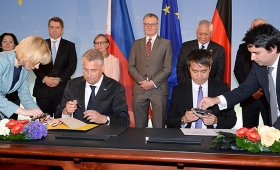Joint VET pathways and solutions also form an international point of focus
BIBB Congress features a strong international alignment – new agreement with the Philippines
44/2014 | Bonn, 19.09.2014

The international activities and cooperation agreements entered into by the Federal Institute for Vocational Education and Training (BIBB), for which there is an increasingly growing demand, are indispensable in terms of overcoming the VET challenges we face in our networked world. “The conditions that enable mutual and cross-border learning to take place need to be improved further,” stressed BIBB President Friedrich Hubert Esser at the end of the BIBB Congress in Berlin, which concluded today. “Intercultural competences form part of a set of key skills that need to become standard within vocational education and training.”
BIBB welcomed just under 100 guests from around 35 countries and four continents to the congress, where they were joined by representatives from international vocational education and training organisations such as CEDEFOP, ETF and UNESCO-UNEVOC. The main focus of the international meetings and forums that took place was on opportunities for extensive networking both with German experts and with the global BIBB partner network, which foreign delegates highlighted as being particularly useful and valuable. 25 specialists from international BIBB partner organisations in Mexico, Thailand, Brazil, Russia, Bulgaria and the Philippines got a chance to find out about German vocational education and training in practice during a visit to the Siemens Technical Academy, where the inter-company training on offer features particularly close networking between the learning venues of the vocational school and the workshop and provides opportunities to pursue dual higher education courses of study.
Although academic education enjoys a higher reputation than vocational training in a large number of countries, many governments have now recognised the value of VET for the employability of young people. In order to help achieve greater acceptance of vocational education and training and to secure the requirement for skilled workers, extensive reform endeavours will be needed with a view to establishing and expanding company-integrated forms of initial and continuing VET. The attendant necessity of enhancing the image and attractiveness of vocational training and of creating the right kind of permeability between vocational education and training and higher education was a topic of debate both at a special international forum that formed part of the BIBB Congress and at a German-Israeli expert workshop looking at examples of good practice.
The international forums at the BIBB Congress were not the only vehicles used to address the topic of deeper cooperation in the field of research and development and a regular exchange of information and experiences. These themes also form the object of a new cooperation agreement signed by BIBB President Esser and Joel Villanueva, the Philippine Director General of the Technical Skills Education and Development Authority (TESDA), on the occasion of the visit to Germany made by State President Benigno Aquino III. Cooperation between BIBB and TESDA will be supported by a declaration by both governments regarding cooperation in vocational education and training, which was also signed today.
“The countries of South-East Asia are currently displaying considerable interest in practically-related and company-integrated vocational education and training, particularly with regard to the ASEAN Economic Community (AEC),” stressed BIBB President Esser. “Considerable significance is attached to vocational education and training research and to the systematic preparation of VET and labour market data as the basis for policy decisions by partners in the region. BIBB is delighted to be able to bring its competence and expertise to bear in this area. We have gained a renowned partner in South-East Asia in the shape of TESDA. This is a region with over 600 million people that also offers fantastic opportunities for German companies. Well trained skilled workers are the foundation of economic success.”
“The ASEAN region is currently one of the fastest growing economic areas in the world,” confirmed TESDA Director General Villanueva. “From 2015 onwards, there will be a rapid increase in the exchange of goods, services, capital and workers. Staff can only be as good as their training. The Philippines can look back on a long and successful record of cooperation with Germany in vocational education and training. A dual VET system already exists in the Philippines. The legal prerequisites for its expansion are already in place. The most important thing for us is to pursue strategic further development which has its foundations in evidence-based research. This is a field in which we are seeking to learn from the experiences of BIBB and to use our expertise and experiences to inform a cooperation process from which all those involved will benefit.”
Background information
In its capacity as a centre of excellence for initial and continuing training in Germany, BIBB acts as an academic and general research institute within a worldwide network. BIBB currently maintains cooperation agreements with 43 institutes of higher education and research institutes. 15 of these are at a national level, and 28 now involve international cooperation.
Further information is available on the BIBB website at http://www.bibb.de/en/50.php .
Contact partner at BIBB:
Britta van Erckelens; e-mail: erckelens@bibb.de
Reprint free of charge – voucher copy requested.